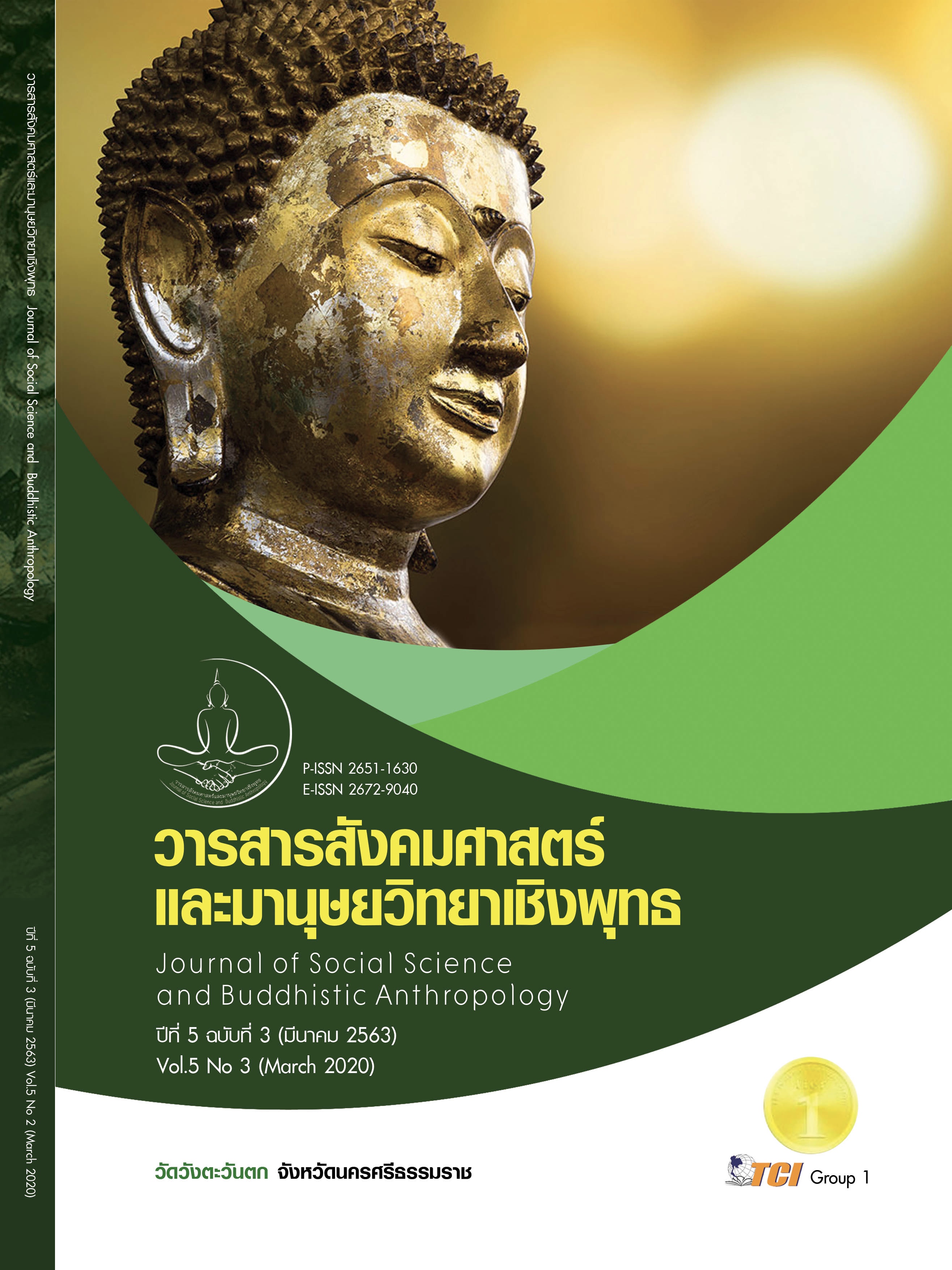RESEARCH METHODOLOGY FOR BUDDHIST STUDIES: PAST PRESENT AND FUTURE
Keywords:
Methodology, Research Methodology, Buddhist Studies, Past, Present And FutureAbstract
This dissertation entitled ‘Research Methodology for Buddhist Studies’ has three objectives: 1) to study the background of the research methodology, 2) to study the desirable research methodology, and 3) to propose the guidelines of research methodology for Buddhist Studies in the current society. This research employed the Qualitative Research where 1) the descriptive analysis, 2) the interpretation, and 3) the synthesis were done through the content analysis in order.The results of the study were found that: The background of the research methodology for Buddhist Studies was the study of Buddhism in the custom and the academic matter. In a university, the Buddhist Studies were emphasized on the study for certifying the educational qualification. Mostly, the synthesis of the research methodology for Buddhist Studies employed the qualitative research. The desirable research methodology in the western concept and theory used three kinds of research methodology: the Qualitative research, the Quantitative research, and the Mixed Method research. The Buddhist concept utilized the process and framework of Ariyasacca (noble truth). The guidelines of research methodology in the current society are somehow based on the philosophy of Rationalism, Phenomenology, Empiricism, and Realism where the processes of Ariyasacca are made through two periods of the research methodology: the first period used the process of finding the problem or finding the topic of the research in order to apply it in the introduction for defining the problem (Dukkha), investigating the problem (Samudaya) and summarizing. The second period used the process of solving the problem through the deduction from the first period as hypothesis (Nirodha), checking and analyzing (Magga), and solving the problem. And the Researcher would like to introduce the new three research model: conservative research model, applied research model and integrated research model.
References
คณาจารย์ มหาวิทยาลัยมหาจุฬาลงกรณราชวิทยาลัย. (2559). ประวัติศาสตร์พระพุทธศาสนา. (พิมพ์ครั้งที่ 2). พระนครศรีอยุธยา: โรงพิมพ์มหาวิทยาลัยมหาจุฬาลงกรณราชวิทยาลัย.
จูเลียน ฮักซ์ลีย์ และคณะ. (2549). วิวัฒนาการแห่งความคิด: ภาคมนุษย์และมนุษยชาติ แปลโดย จุฑาทิพย์ อุมะวิชนี. (พิมพ์ครั้งที่ 4). กรุงเทพมหานคร: สำนักพิมพ์มหาวิทยาลัยธรรมศาสตร์.
จูเลียน ฮักซ์ลีย์ และคณะ. (2549). วิวัฒนาการแห่งความคิด: ภาคมนุษย์และโลก. แปลโดย จุฑาทิพย์ อุมะวิชนี. (พิมพ์ครั้งที่ 5). กรุงเทพมหานคร: สำนักพิมพ์มหาวิทยาลัยธรรมศาสตร์.
ณรงค์ โพธิ์พฤกษานันท์. (2557). ระเบียบวิธีวิจัย หลักการ แนวคิด และเทคนิคการเขียนรายงานการวิจัย. (พิมพ์ครั้งที่ 9). กรุงเทพมหานคร: เอ็กซเปอร์เน็ท.
พระธรรมปิฎก (ป.อ.ปยุตฺโต). (2541). พุทธธรรม. (พิมพ์ครั้งที่ 7). กรุงเทพมหานคร: โรงพิมพ์มหาจุฬาลงกรณ์ราชวิทยาลัย.
พระพรหมคุณาภรณ์ (ป.อ.ปยุตฺโต). (2556). โยนิโสมนสิการ วิธีคิดตามหลักพุทธธรรม. (พิมพ์ครั้งที่ 24). กรุงเทพมหานคร: ปัญญาประดิษฐาน.
พระมหาอดิศร ถิรสีโล. (2543). ประวัติคัมภีร์บาลี. กรุงเทพมหานคร: มหาวิทยาลัยมกุฏราชวิทยาลัย.
ไพศาล วรคำ. (2559). การวิจัยทางการศึกษา. (พิมพ์ครั้งที่ 8). มหาสารคาม: ตักสิลาการพิมพ์.
มหาจุฬาลงกรณราชวิทยาลัย. (2535). พระไตรปิฎกภาษาไทย ฉบับมหาจุฬาลงกรณราชวิทยาลัย. กรุงเทพมหานคร: โรงพิมพ์มหาจุฬาลงกรณราชวิทยาลัย.
รัตนะ บัวสนธ์. (2556). ปรัชญาวิจัย. (พิมพ์ครั้งที่ 3). กรุงเทพมหานคร: โรงพิมพ์แห่งจุฬาลงกรณ์มหาวิทยาลัย.
สิทธิ์ บุตรอินทร์ . (2559). ปรัชญานิพนธ์. กรุงเทพมหานคร: สยามปริทัศน์.
Donald K. et al. (2000). The State of Buddhist Studies in The World 1972-1997. Bangkok: Center for Buddhist Studies Chulalongkorn University Bangkok.









